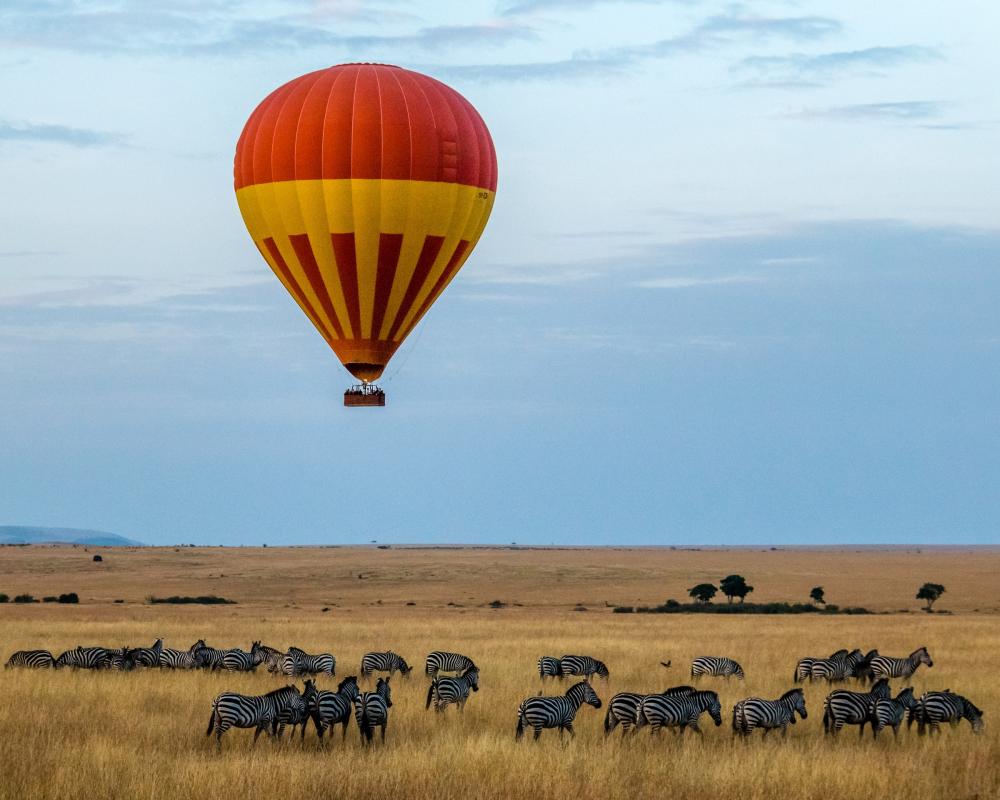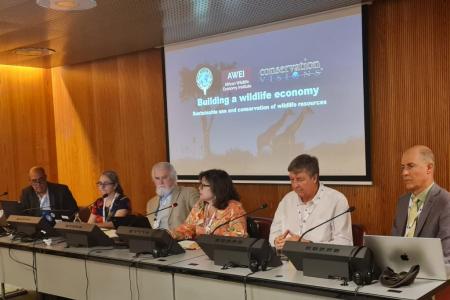
Questions on a Wildlife Economy for Beginners
13 Apr 2022
Written by AWEI Fellow Ms Hollie M’gog, Kenya
10 minute read
Let us begin with three questions:
1.
Are there really relationships between economic growth and biodiversity conservation?
2.
Is constant economic growth really the way forwards to a more just, sustainable, equitable and biodiversity-filled future?
3.
Does effective biodiversity conservation depend upon understanding the economic theory and why?
Man, whether we like it or not, is the basis upon which all other activities occur, even that activity of the conservation of biodiversity. This despite the fact that it is the biodiversity that allows our very existence on Earth. Economics is created, moulded and understood by man alone and, according to Heilbroner in 1999, ‘is the dominant social science and pre-eminent advisor to nearly all levels of governance and policy making.’
So, is economic growth a challenge to biodiversity conservation and management, or should ecological economics underlie all aspects of economic growth? If conservation does not underlie economic growth then we would be starting off on the premise that there is conflict between biodiversity conservation and economic growth.
But how do we then mesh our principled ideas on biodiversity and biodiversity conservation with human and social values; mesh them with human desires and aspirations and most of all, mesh them with population growth, resource consumption and the inequality of access that currently exists?
Indeed, before we can begin to answer these questions we must ask of the economy, what differentiates economic growth and economic development? Typically, but not always, development is considered qualitative, encompassing social and economic dimensions. Most ‘developed’ nations feel they are above and beyond this activity. Growth is a testosterone filled competitive measure that has found its way, like its associated pollution, over the entire globe – countries push and shove, jostle and vie for higher growth and then try to find ways to stem and staunch, stomach and foot the environmental costs of climate change, pollution, over-exploitation and the seemingly never-ending habitat loss.
Yet surely, the realisation that economic prosperity rests on the back of a stable climate, sustainable exploitation, habitat and species protection and clean industry, cannot be too long in coming to the minds of those in governance and policy making?
So, what role does the newly emergent, African conservationist play in this game of biodiversity economies? They must emerge from their training with less specialisation and a more broad-scale approach to their field (see: What's best for Wildlife Economies). If ecological economics is a “transdisciplinary field of study that addresses the relationships between ecosystems and economic systems in the broadest sense,” (Costanza et al. 1991:3) then their role is to bring ecological principles into policy and governance.
The newly emergent, African conservationist must show that it does not take habitat destruction, pollution and over-exploitation to raise standards of living. In fact, human well-being, including standards of living, depend on habitat protection, clean industry and sustainable exploitation.
It is because all peoples and all societies have more wants than resources, that the field of economics emerged. This being the study of the allocation of resources among competing end users. However, the existence of those resources depends entirely on intact ecosystems with high biodiversity and linking corridors.
Let us now circle back to our opening questions:
Our dependence on resources ebbs and flows, shifts with time and technology, becomes more competitive and violent in times of drought or famine, fear or political unrest; becomes more relaxed and considerate in times of plenty, in times of peace and in times when travel is easy and money can flow across currencies without hinderances.
But always, the availability of resources requires the Earth to provide, and our Earth can only provide if it has enough healthy ecosystems to balance the exploited ones. It is this balance which makes economic growth and biodiversity conservation inseparable.
I’m not sure we have ever been on a path towards a more just, sustainable and equitable future. The only thing we can be sure of in this age, is that we are hurtling towards a future with minimal biodiversity. Our job now, is to re-direct the Train of Humanity onto a new set of tracks, ones where biodiversity conservation forms the basis of all economic decisions, where economic growth is not a challenge to biodiversity conservation, nor biodiversity conservation a challenge to economic growth.
As either producers or consumers in our economy, with demands and desires, we must find the ways and the means to ensure that economies that must necessarily scale-up to match population growth, are scaled up with constant reference and feedback to ecological principles.
We need training, research, outreach and engagement for the better governance of African wildlife economies, that ultimately and definitively benefit biodiversity conservation and inclusive, sustainable development.
So where then are there places for you in this wildlife economy? How can you create a business that not only cares for you and your carefully planned children, but also encompasses conservation, climate and communities? Wildlife consultancy, ethnobotany and wildlife tourism are all open to change and adaptation to a more sustainable path. The collection and maintenance of native tree seedlings and seed banks are both viable business ideas. There are also hundreds of businesses that earn off wildlife management and conservation, from fencing and maintenance, to feed supplements and products, equipment and supplies, transport, taxidermy, tourist accommodation, veterinary, environmental monitoring and conservation education and training. Wildlife products are highly sought after and can be produced in sustainable and safe manners, from honey to eland milk, mushroom packaging to bone jewellery.
The oft repeated maxim is: ‘be the change that you wish to see’, and for wildlife economies to scale and remain sustainable and productive we must keep this cliché in mind.
Want to know more?
Learn about the state of African wildlife economies:
- Africa Wildlife Economy Research Project, ALU School of Wildlife Conservation
- State of the Wildlife Economy in Africa, BIOPAMA
Feature photo by Sutirta Budiman on Unsplash.
We support the free flow of information. Please share:
More content
-

Drivers of hunting and photographic tourism income to communal conservancies in Namibia
Mr Joseph Goergen …Hunting and photographic tourism provide ecosystem services that can facilitate conservation. Understanding factors influencing how tourism industries generate...
2024Research -

SANParks Vision 2040: A New Era for Conservation in South Africa
Mrs Emily TaylorReimagining Conservation: SANParks' Vision 2040
South African National Parks (SANParks) has unveiled its ambitious Vision 2040, a…
Articles -

In defence of wild meat’s place at the table
Tim VernimmenQ&A — Conservation scientist E.J. Milner-Gulland
Sustainable and safe consumption of wildlife is possible, and important for those…
Articles -

The diverse socioeconomic contributions of wildlife ranching
Candice Denner…The diverse socioeconomic contributions of wildlife ranching are increasingly recognized as a vital element of sustainable development, particularly...
2024Research -

A conflict of visions: Ideas shaping wildlife trade policy toward African megafauna
Mr Michael 't Sas-Rolfes…The issue of wildlife trade is a major concern for the conservation of African megafauna, such as elephants...
2024Research -

Barriers to the Participation of the Traditional Leadership Institution in Promoting Rural Agricultural Development
Dr Wiseman Ndlovu…The Traditional Leadership Institution (TLI) is constitutionally recognised to promote rural development in South Africa. It works with...
2022Research -

Elephant in the Room - Why a trophy hunting ban would hurt conservation and development
Dr Francis Vorhies“Trophy hunting, if well managed, conserves wild species and habitats and enhances livelihoods in rural communities.” - Dr...
2024Briefs -

Biodiversity means business: Reframing global biodiversity goals for the private sector
Dr Francis Vorhies…The Convention on Biological Diversity strategic goals direct the conservation and sustainable use of biodiversity from global to...
2019Research -

The 33rd Meeting of the Animals Committee of the Convention on International Trade in Endangered Species of Wild…
Articles
Get updates by email
Through impactful research, stakeholder engagement, and professional development, AWEI is supporting the wildlife economy across Africa. Please subscribe for occasional updates on our work and forthcoming events.
Sign up for a quarterly dose of AWEI insights
In a complex and changing world, AWEI generates strategic ideas, conducts independent analysis on wildlife economies, and collaborates with global scholar-practitioners to provide training and expertise for biodiversity conservation, climate resilience, and inclusive economic opportunities in Africa.
